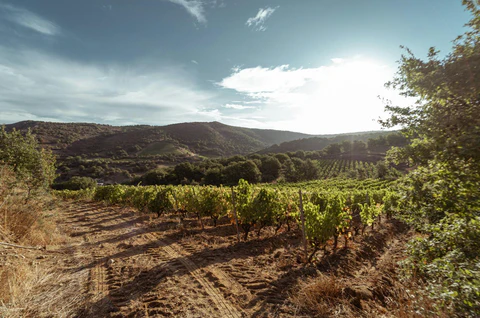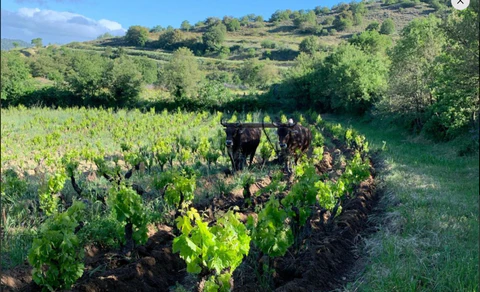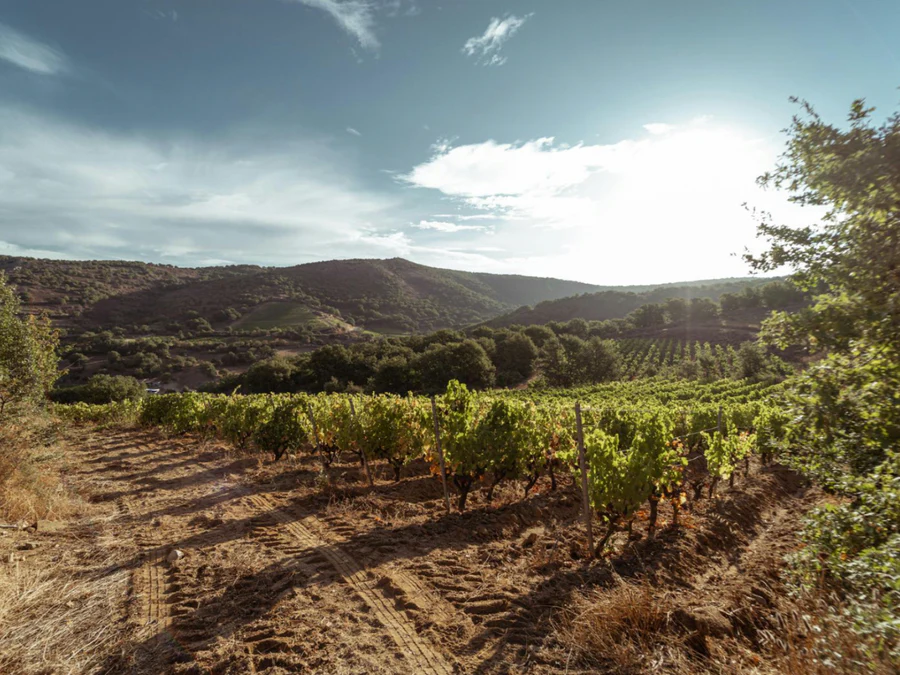Sardinia is an island that that brings to mind blissful summer days along its stunning coastline. But head inland and there visual narrative different to that of crystalline blue waters.|
The heart of Sardinia is the mountain range of Gennargentu, with the surrounding landscape typified by its wild, untamed nature. This is Barbagia; a name that originates from the Roman occupation when the local Sardinians refused to be conquered. Its etymology is shared with ‘Barbarians’ as the locals were so named by Cicero.

But within this wilderness there is a resilience. A resilience to the challenging elements and a resolve to work with nature. And nowhere is this more apparent than the tiny village of Mamoiada. Travelling here is like travelling back in time.
Situated on an elevated position it has been a winemaking centre for centuries, and wine is the dominant industry here. Its centrality to the culture of Mamoiada is evident in the town’s renowned Carnevale. In late February or early March (Easter depending), the streets become the setting for a reenactment of a historic battle between the Mamuthones and the Issohadores, the former dressed in a striking get-up of a black wooden mask, black sheepskin robes and cowbells on their backs. Wine is vital to the festivities; the Cannonau freely poured a symbol of the local heritage.

Mamoiada is home to over 200 winemaking families. And yes, as you can guess, many of them are related. Historically, the harvested grapes were used in a social co-operative in order to maximise on production. Yet following a gradual realisation that doing so was overlooking the individual characteristics of each vineyard, winemakers started to vinify their own grapes, eventually leading to the formation of the Mamojá association in 2015. Over 30 wineries are now part of this association. Collectively they are drawing attention to the elements that characterise the wine heritage of this area.
There is a local pride tied to knowing exactly from which vineyard a wine originates. This is taken one step further with the Sardinian dialect term, Ghirada, which refers to a specific plot or Cru. The goal has become to draw attention to the differences between each ghirada rather than placing the main emphasis on the winemaker. Of course the winemaker’s intervention is essential, but the main focus here is the terroir.
This is clearly the case with the three winemakers who we have just welcomed to the Passione Vino family. VikeVike, Teularju and Cantina Vinzas Artas. The former two are both descended from the same winemaking family, the Sedilesu. Wine really is in their blood. VikeVike is the project of Simone Sedilesu who learnt from his grandfather Giuseppe. Teularju is the project of Francesco Sedilesu and his three children Vincenza, Giuseppe and Giovanni plus his wife Elisabetta. This family has been making wine together for two decades with the company in its current form established in 2017. Cantina Vinzas Artas is the project of Giorgio Gaia and Piercarlo Sotgiu. Though established recently, their mission has been to acquire old vineyards, some over a century old, or to plant new vineyards using cuttings from old vines, in order to continue the winemaking traditions of their ancestors.

But before getting into the methods that each of these winemakers follow, a little more about the territory. Mamoiada’s setting in the Sardinian mountains means that the surrounding vineyards are at altitudes ranging between 200 and 700 metres above sea level. Soil is mainly granitic, but in places there are infiltrations of a green metamorphic stone. The undulating landscape that surrounds Mamoiada means that the various vineyards are distinguished by their orientation, which strongly affects the quality of the wines.
For instance Cantina Vinzas Artas notes that their Ghirada Garanuele is exposed to the South-West at 650m and Ghirada Su Piducru has an easterly exposure at 850 metres of altitude. The vines have traditionally been trained in the Alberello Basso bush system on account of the steep inclines. The rows are also planted close together, so close that tractors are impassable and so the land has traditionally been worked with oxen. This has also facilitated the adoption of sustainable, organic methods by the producers.
Cannonau is the principal grape planted in this area. Also known as Garnacha and Grenache, it is a late ripening variety that is particularly suited to the hot, arid conditions.
Interspersed between these vines is a small percentage of the local white variety known as Granatza, a name that itself seems to derive from the Latin word ‘vernaculum’ or local. This grape was traditionally used for blending and it was only recently that experiments were made to create it as a monovarietal wine. Because the Granatza vines are planted within Cannonau vineyards, yields are small, which only adds to their increasing appeal. Cantina Vinzas Artas is among the first producers to plant new vineyards of exclusively Granatza. These are now 6 years old, and the harvest of this is paired with older vines interspersed within the Cannonau vineyards.
So to come full circle, the founding mission of all three of these producers is to intervene as little as possible in the cellar, and to vinify the grapes not just in variety but also in location. Take Teularju, for instance, where all the wines take their names from the respective Ghirada (Ocruarna, Erula, Rizza, Cara’Gonare), with each name derived from its characteristics. For VikeVike, this respect for the products of the terroir is phrased as only ‘guiding and not manipulating the grapes’. In the philosophy of Cantina Vinzas Artas, it is to pay tribute to their ancestors and the knowledge that has been passed down about both the territory and Mamoiada viiticulture’.
Strong beliefs indeed. Bring on the Barbagian Invasion. We have been waiting too long…


